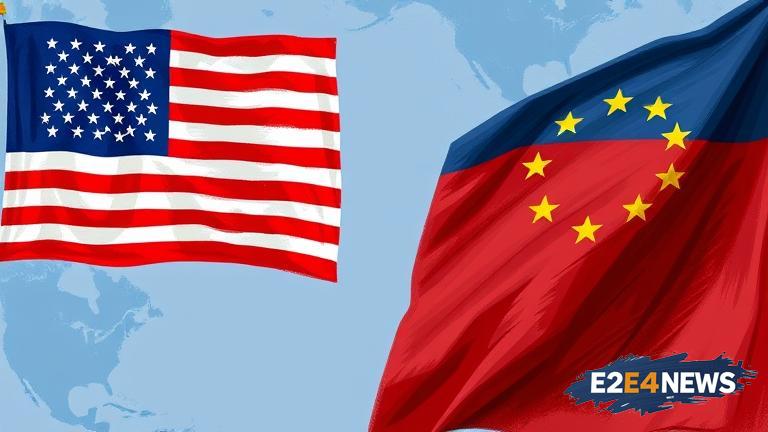The European Commission has expressed surprise over Germany’s criticism of the EU-US trade deal, which has been in the works for several years. The deal, aimed at reducing tariffs and increasing trade between the two blocs, has been a subject of controversy among EU member states. Germany’s disapproval has raised concerns over the agreement’s future, with some fearing it may not be ratified by the European Parliament. The Commission had expected Germany to be a key supporter of the deal, given its strong economic ties with the US. However, Germany’s concerns over the deal’s potential impact on its automotive industry and environmental standards have led to a reevaluation of its position. The EU-US trade deal has been a major priority for the Commission, with the aim of creating a more level playing field for European businesses in the US market. The deal would eliminate tariffs on a wide range of goods, including cars, agricultural products, and pharmaceuticals. Despite the potential benefits, the deal has faced opposition from various groups, including environmentalists and consumer organizations. They argue that the deal would undermine EU standards and regulations, particularly in areas such as food safety and climate change. The Commission has attempted to address these concerns, emphasizing that the deal would not compromise EU standards. However, Germany’s criticism has highlighted the challenges of negotiating a trade deal that satisfies all EU member states. The Commission must now navigate the complex web of interests and concerns to ensure the deal’s ratification. The EU-US trade deal has significant implications for the global economy, with the potential to increase trade and investment between the two blocs. The deal could also have a major impact on the EU’s relationships with other trading partners, including China and the UK. As the Commission works to address Germany’s concerns, it must also consider the broader geopolitical implications of the deal. The US has been a key partner for the EU in areas such as security and defense, and the trade deal could further strengthen this relationship. However, the deal has also raised concerns over the EU’s dependence on the US, particularly in areas such as agriculture and energy. The Commission must balance these competing interests to ensure that the deal serves the EU’s long-term interests. The EU-US trade deal has been the subject of intense negotiations, with the Commission working closely with US trade officials to reach an agreement. The deal has been hailed as a major achievement, with the potential to boost economic growth and create jobs on both sides of the Atlantic. However, Germany’s criticism has highlighted the challenges of negotiating a trade deal that satisfies all parties. The Commission must now work to address these concerns and ensure the deal’s ratification, or risk seeing the agreement falter. The EU-US trade deal has significant implications for the future of global trade, with the potential to set a new standard for trade agreements. The deal could also have a major impact on the EU’s internal market, with the potential to increase competition and innovation. As the Commission works to address Germany’s concerns, it must also consider the broader implications of the deal for the EU’s economy and society. The EU-US trade deal has been a major priority for the Commission, with the aim of creating a more integrated and competitive economy. The deal has the potential to increase trade and investment between the two blocs, creating new opportunities for businesses and consumers. However, the deal has also raised concerns over the EU’s ability to regulate its own market, particularly in areas such as environmental protection and consumer safety. The Commission must balance these competing interests to ensure that the deal serves the EU’s long-term interests. The EU-US trade deal has been the subject of intense scrutiny, with many questioning the deal’s potential impact on EU standards and regulations. The Commission has attempted to address these concerns, emphasizing that the deal would not compromise EU standards. However, Germany’s criticism has highlighted the challenges of negotiating a trade deal that satisfies all EU member states. The Commission must now work to address these concerns and ensure the deal’s ratification, or risk seeing the agreement falter. The EU-US trade deal has significant implications for the future of global trade, with the potential to set a new standard for trade agreements. The deal could also have a major impact on the EU’s internal market, with the potential to increase competition and innovation. As the Commission works to address Germany’s concerns, it must also consider the broader implications of the deal for the EU’s economy and society.




